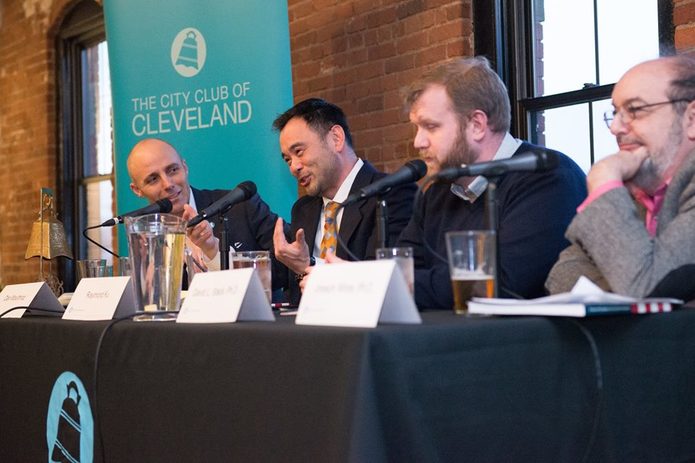Thursday, February 14, 2019
Do We Want Presidents Who Break the Rules?

by Karen Leventhal
This week’s ConstitutionALE explored the limits of the President’s power. There is much fear about Presidents overreaching their power and becoming dictatorial. It’s an understandable fear as Stalin and Hitler were strong executives and things didn’t go so well.
On the other hand, they didn’t operate within the confines of a democratic republic, who’s problems tend toward doing too little versus too much. The panelists all agreed that the founders left presidential powers vague. Perhaps this is because they anticipated a need for activism in the Executive branch. Historian David McCullough says:
“The presidency is like a soft leather glove, and it takes the shape of the hand that’s put into it. And when a very big hand is put into it and stretches the glove — stretches the office — the glove never quite shrinks back to what it was.”
I would argue that much but not all of presidential activism has been positive. Most presidents who push the limits of their power do so with the belief they are failing in their job if they remain helpless during a crisis. Here are some examples:
- Abraham Lincoln issued the Emancipation Proclamation which defied the constitutional protection of slavery. He made the argument that the slaves provided a military advantage to the confederacy. Thus, he had the right to end slavery because of his constitutionally given powers as commander in chief during wartime.
Most people would agree that he had not taken this bold move and southern states rejoined with slavery intact, that over 500,000 civil war soldiers would have died for nothing. The issue of slavery had haunted the country since its inception and would have inevitably resurfaced and created war again. Perhaps the next time it would have permanently dissolved the country.
Furthermore, we all see now, that slavery was morally abhorrent and fundamentally incompatible with the aims laid out in the Declaration of Independence. The country could not continue to survive with slavery in its midst.
- In 1902, a coal miners’ strike threatened to shut down the country and cause millions of people to freeze to death. Then President, Theodore Roosevelt threatened to nationalize the mines. He himself was very reluctant to take radical action and was worried “it would form an evil precedent” but he would not let the U.S. descend into “suffering and chaos.” His handling of the coal mine strike is considered a resounding success that averted crisis.
- When Franklin Roosevelt took office a quarter of the American workforce was unemployed, many were starving. Unlike his predecessor Herbert Hoover, he took many bold actions to lift the nation out of Depression. By the time the Supreme Court invalidated several New Deal Programs, these programs had already begun to turn the country towards recovery. Had FDR not taken bold action, the country might have collapsed.
However, one of his other bold actions, interning Japanese Americans during WWII, is widely considered a failure especially considering that not a single Japanese American was ever convicted of espionage during WWII.
- President Trump is threatening to declare a national emergency to get a southern border wall built. He claims illegal immigration on the border poses a threat to national security. Others claim his assertions are entirely overblown. Will he use his executive power to override congress? Will he be right if he does?
One of the panelists, Professor Raymond Ku of Case Western Reserve Law School, made the point, several times, that the founders created a system for people--- one that had to work with the failings and strengths of human beings. Human beings are not abstract ideals.
After the panel, Professor Ku and I discussed, that the founders intentionally left Executive office powers elastic because they understood that as the country evolved there would be problems they could not foresee. They understood that the sometimes presidents would have to push the boundaries to help the country.
It’s not whether the President pushes the limits. It’s whether they make the right call when they do it.
The founders knew that the President wasn’t chosen simply to carry out the constitution. S/he was chosen to have good judgement to know when and how to push the boundaries. We, the electorate, have a vital role to play in the executive office because we choose an executive and their powers of good judgement and we live with the results.
Karen Leventhal is the founder of Verdant Trade, a business to business (B2B) e-marketplace for trading ethically manufactured wholesale goods.
Listen to ConstitutionALE: Is the President Above the Law? Executive Power and its Limits here. Watch it here.





